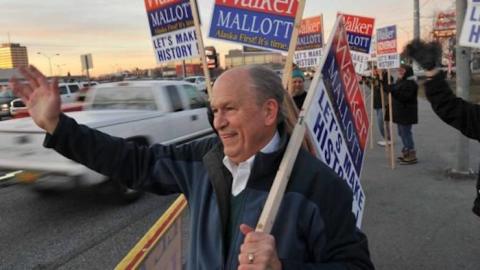There is only one governor in the US with an "I" next to their name: Alaska Governor Bill Walker. However, Walker announced late Friday that he has suspended his bid for re-election -- citing the poor odds against his campaign winning the election and preventing the candidate he least wants to win from getting elected.
"With more time, I am confident that [Lieutenant Gov. Valerie Davidson] and I could deliver a message and a campaign that could earn a victory in this election," Walker wrote in an Instagram post Friday night. "But there are only 18 days remaining before election day. Absentee ballots have already been mailed, and Alaskans are already voting. In the time remaining, I believe we cannot win a three-way race."
It was already going to be a tough race for Gov. Walker, but his campaign suffered a major blow just weeks before Election Day -- the abrupt resignation of Lt. Governor Byron Mallott. Mallot reportedly made remarks that Governor Walker and Mallot's replacement, Valerie Davidson, found to be inappropriate. The specifics of what was said are not clear at this point.
Walker also says his decision comes after speaking with Alaska voters to determine whether he or Democratic nominee and former US Senator Mark Begich had a better chance at beating Republican nominee Michael Dunleavy. An October 16 poll showed Dunleavy with about a 17-point advantage over Walker and Begich, with the incumbent and the Democrat splitting the remainder of the vote about evenly.
Walker endorsed Begich with just two weeks to go before Election Day. Though he has suspended his campaign, Walker's name will still appear on the ballot.
Perils of a Partisan Primary System for Independents
At the crux of Walker's decision is that he saw his campaign as a potential spoiler for one particular party -- the Democratic Party, in this case -- which could potentially hand the candidate he least wants to win the election. This is despite the fact that he is the incumbent.
The truth is that even as the sitting governor, Walker still lacks the institutional support that could pressure the Democratic nominee to drop out instead because there is no party apparatus for him to operate.
Organizations like Unite America have emerged to give capital "I" independent candidates like Walker the support structure they need. However, the system in place in Alaska ensures the electoral waters remain perilous for these candidates to swim.
Under a partisan primary system, the focus of the election remains entirely on the Democratic and Republican Parties, and their candidates, from the beginning. Then, the winners of the primary elections are elevated by the media as the only two viable options and any additional candidate is nothing more than a spoiler -- even if that candidate is the incumbent.
Alaska has a somewhat unique primary system for statewide races. The Republican primary is open to registered Republicans and independents, while all other parties appear on a blanket primary ballot -- but the focus remains on just the two major parties, while capital "I" independent candidates don't get any attention at all.
It ties in to a previous point I made about a system that pits two sides against each other -- one is good; the other is evil, though who is the virtuous and who is the wicked depends solely on the individual's perspective. The good must be preserved, while the evil defeated at all costs. Anyone who interjects in this two-sided battle will only ensure evil's victory.
Consider the statement from Casey Steinau, chair of the Alaska Democratic Party:
"We are also proud of him now for putting Alaska first once again, and stepping aside for the greater good. Bill Walker has said himself that he has never shied away from making tough decisions, and surely this was among the toughest he has had to make as governor."
"Stepping aside for the greater good."
And then there is the response from the Republican Governor's Association:
"At a time when Alaska faces enormous challenges, Mark Begich and Bill Walker have been more focused on protecting their own power and their shared failed liberal agenda than actually addressing these critical issues. Alaskans deserve better than this political charade by Mark Begich and Bill Walker."
In other words, the other side is only obsessed with power and taking control at all costs.
There are other independent candidates who find themselves in a similar situation as Walker did. Kansas independent Greg Orman and Maine State Treasurer Terry Hayes, for example, must contend with the media talking heads, partisan pundits, and party operatives who push the narrative that candidates outside the major parties will never be viable and will only spoil elections to the benefit of pure evil.
This will not change until there is broad systemic reform. This includes reforming the primary system. This includes reforming the choose-one voting method. Until we reform elections to serve voters over parties, capital "I" independents and third party candidates will always find themselves in the same precarious position as Gov. Bill Walker.
